Wondering if a MasterClass on mindfulness and meditation is worth it?
Or what value this class has to offer above a typical meditation app or youtube video?
Then this Jon Kabat-Zinn MasterClass review is here for you.
I’ve completed the Jon Kabat-Zinn MasterClass and followed along with all the meditations. Plus over the years I’ve tried other meditation practices and apps so I can compare and contrast on what else is on offer.
In this Jon Kabat-Zinn MasterClass review I’ll be covering everything you need to know and sharing my personal experience to help you decide if this is the right course for you.
So let’s get started!
If you’re short on time then here are the highlights:
.
Quick Summary
Learn how to:
- Increase self awareness, focus on the present, and reduce negative emotions
- Build skills to better respond to stress and manage pain
- Become more mindful in your actions
- Meditate in a variety of ways and poses
- Understand the science behind how and why mediation works
Pros
- Comprehensive course grounded in scientific principles and taught by a credible and respected teacher
- Well structured, lessons build on and support each other
- Great balance of theory and practice
- Extremely effective (or it was for me)
- Massive feel good factor if you give it a go
Cons
- The class itself needs some time commitment
- Would benefit from complementary footage to break up the presentation
- Duplicates some of what is in his book
Course length: 20 videos totalling 6 hours and 31 minutes of viewing time.
Best for: Anyone who wants a greater level of health and wellbeing and is open minded and curious. Also great for anyone who has struggled with mindfulness and mediation in the past and would appreciate a fuller and more scientific understanding of its benefits.
Overall: An incredibly thorough class that really helped me realize the complete benefits of mindfulness and meditation for the first time. Lots of practical tips that really guide you on your way. If MasterClass is within your budget this class could be a great investment.
Now for my more detailed review, here’s what I’ll be covering:
- A look inside the Jon Kabat-Zinn MasterClass
- Pros and cons of the course
- Is the content unique?
- Is there anything better?
- Verdict: Is the Jon Kabat-Zinn MasterClass worth it?
First the basics:
About Jon Kabat-Zinn
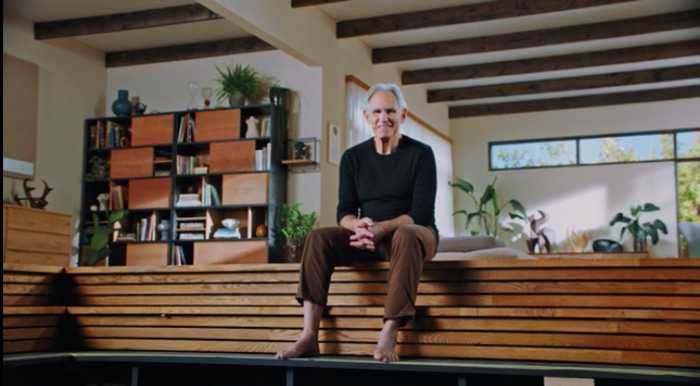
Jon Kabat-Zinn is an American professor emeritus of medicine, internationally recognized author and teacher, and is generally regarded to be the godfather of modern mindfulness.
Kabat-Zinn founded the Centre for Mindfulness and the Mindfulness-Based Stress Reduction (MBSR) programme at the University of Massachusetts Medical School.
He’s devoted half a century to bringing mindfulness and mediation into the mainstream, demystifying it, grounding it in a scientific context and making it accessible to all.
Tens of thousands of people have benefitted from the MBSR programme. Learning how to participate in their own health care to respond more effectively to stress, disease and pain.
The program is now the gold standard for the application of mindfulness to the stresses of daily life.
Kabat-Zinn trains and teaches all over the world in a range of contexts, including prisons, hospitals and schools. He‘s the author of 14 books and his scholarly articles on the application of mindfulness to stress have triggered a large body of research on the benefits of the practice.
In what he calls his NON-MasterClass, Kabat-Zinn seeks to bring to the surface our innate awareness. He shares wisdom and practical guidance that will help you get in touch with that awareness, reduce your stress, calm your mind, ease discomfort and make the most of every single moment.
And if you haven’t already seen the trailer for his MasterClass, you can check it out here:
About MasterClass
MasterClass is one of most comprehensive and popular online learning platforms out there.
It differs from other platforms in two main respects: Its teachers have achieved global recognition due to their talents and achievements and it has very high cinematic production values. It is also rigorous when it comes to quality of content and learning materials. This combination provides a unique and compelling learning experience.
Jon Kabat-Zinn’s MasterClass sits beside classes from over 150 other world renowned experts such as Brandon McMillan, Margaret Atwood, Neil deGrasse Tyson, Gordon Ramsay and Hans Zimmer.
Having taken more than twenty five MasterClasses myself, I can report that many are fantastic and insightful. However, some are definitely better than others. And it’s important to do your research first to make sure the course you’re thinking about is the right one for you.
If you want more details on MasterClass and some of its most popular classes, check out our Masterclass review and best MasterClass article.
Inside the Jon Kabat-Zinn MasterClass
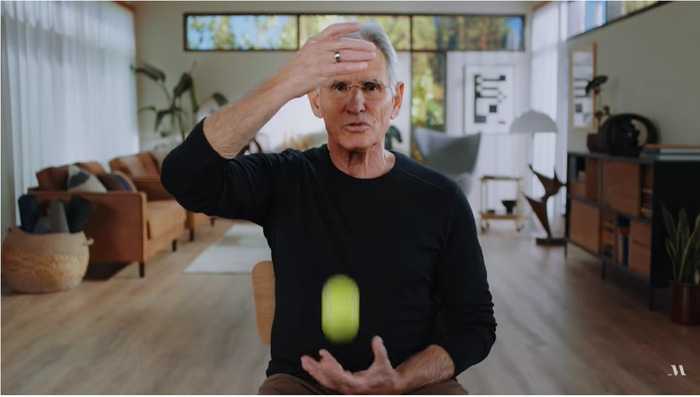
Jon Kabat-Zinn’s MasterClass comes in at six and a half hours of viewing time. It consists of:
- 20 lessons which are mostly between 20-30 minutes long
- Access to an online community
- A 26 page workbook summarising main concepts of the lessons and much more.
You’ll be getting several guided meditations, interspersed throughout with mini documentary style videos where Kabat-Zinn explains the ideas and science behind the practice of mindfulness.
I’ve split the Jon Kabat-Zinn MasterClass into 6 sections and summarized them below to give you a sense of what’s involved.
- Meet your instructor
- An introduction to mindfulness
- A guide to meditation
- Dealing with stress, pain and suffering
- Mindfulness, yoga and art
- Final thoughts
Section 1/6: Meet your Instructor
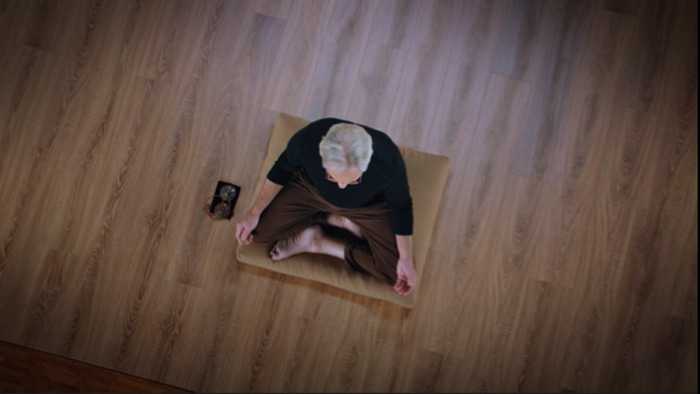
“Taking your seat in meditation, is taking a stand.”
In his introduction, Kabat-Zinn outlines the idea of mindfulness and shares many real life examples of the benefits that can be garnered from it.
Whether it’s working with patients or prisoners, he describes it as providing an oxygen line straight into the heart to provide what is most fundamental about being alive.
He’s keen to emphasise that this class is not about turning you into a guru, you’re already fine as you are. It’s about pouring energy into what’s best about you, and then seeing what happens.
He sets out what he hopes you will gain from the MasterClass and that is that you will:
- Have a framework for understanding the importance of mindfulness in your life
- Befriend yourself, and the present moment
- See that there are different doors to mindfulness
- Not feel the need to perfect anything, and
- Most of all, wake up!
Section 2/6: An introduction to mindfulness
A guide to mindfulness
“Mindfulness… is a way of being in wise relationship with life unfolding, in the only moment it ever does.”
Here, Kabat-Zinn defines in more detail what he regards mindfulness to be.
It’s a great way to start the course, since it puts the rest of the class into context. Especially since his definition arises from his experience of the use of mindfulness in medicine and healthcare.
It has 4 components which he explains in detail so you can fully understand the direction the class is going to take, and why.
These components are, being:
- Aware and attentive
- Intentional
- In the present
- Non judgemental
The being part of the definition is absolutely key, Kabat-Zinn shares why during this lesson.
And it’s one of those explanations that’s super simple and super obvious, but very profound!
He then goes on to describe ways in which becoming mindful empowers you to:
- shift your relationship to the problems facing you
- come to terms with things as they are, and
- realize that you’re bigger than the stories you tell yourself about who you are.
Attitudinal foundations of Mindfulness
Here, Kabat-Zinn shares attitudinal factors, or skills, that you should hold in your heart in order to live life mindfully. They are:
- Non judging
- Patience
- The beginner’s (or ‘don’t know’) mind
- Trust
- Non-striving
- Acceptance
He discusses each one clearly. What they are, and what they are not. And he explains how cultivating each one will help to support the practice of mindfulness.
This is a great segue into the next section, which tackles Kabat-Zinn’s approach to meditation.
Section 3/6: A guide to meditation
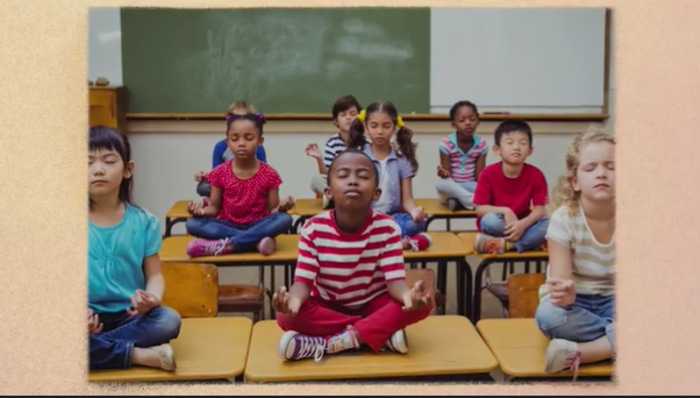
“Meditation is, literally, not what you think.”
This section starts out by Kabat-Zinn sharing the difference between formal and informal meditation practices.
Essentially, the first you have to make time for, the second consists of life itself + awareness.
Kabat-Zinn sees awareness as part of our human makeup, but a part that is rarely given air time and is easily eclipsed by ‘thinking’.
He sets out the intentions you might have in the early stages of meditation, but emphasizes that these are just providing context, they are not the meditation itself.
“The real invitation of mindfulness is to bring the domains of being and doing together, so that our doing comes out of being.”
I loved this section, I’ve tried lots of meditation apps and wondered how long I would have to keep going before getting ‘this thing called meditation’ right.
Kabat-Zinn’s explanation of what meditation is completely shifted my understanding of it and changed everything.
But no spoilers. Except to say I learned how to see value, even in a wandering mind.
Guided meditation: Dropping in
“Any moment is a perfect moment for actually being fully present.”
Kabat-Zinn guides you through a simple, introductory meditation. Everything he talked about in the previous lesson is deployed.
Along with tips for maintaining your awareness as you move into whatever’s next. To blur the lines, so to speak, between meditation practice and life itself.
Working with thoughts while meditating, Meditation postures and Putting out the Mat
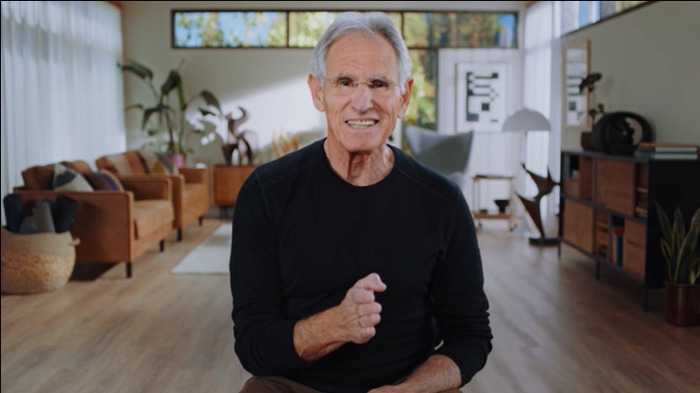
In these three lessons, Kabat-Zinn firstly shares some tips for settling a fidgety, wandering mind.
In particular, he uses a massively helpful analogy for thinking about the mind so you don’t get caught up in its turbulence.
He also talks about using:
- Objects of attention
- A ‘thought mirror’
- ‘Volume control’, and
- Ways to work with an active mind
These were all super helpful techniques for not getting carried away by the thought stream.
He then moves on to provide insights into the different postures used for meditation, and some of the props you can use to help with posture.
He’s keen to emphasize that you shouldn’t get hung up on adopting a particular pose, but find a posture that enables you to be balanced, open and awake.
Lastly, Kabat-Zinn provides some wisdom on dropping down into the actuality of your life. In other words, putting the welcome mat out for whatever is going on for you in the moment. Good or bad.
“It’s not about attaining anything. It’s about recognizing that you’re already whole”
Two guided meditations: Falling awake & Choiceless awareness
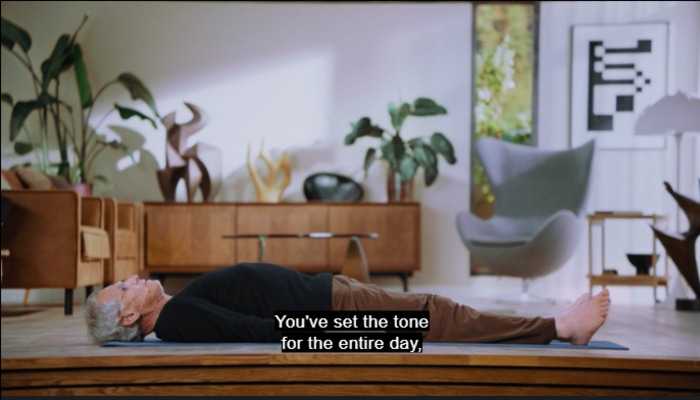
The following chapters contain two, practical, guided meditations. Each using a different ‘doorway’ to awareness.
In summary, Kabat-Zinn takes you through:
- A ten minute lying down meditation – ideal for those who tell themselves they have ‘no time’ to mediate. Just set the alarm ten minutes earlier and ‘fall awake’ in a way that lets you carry mindfulness over into the rest of your day.
- A thirty minute sitting meditation designed to cultivate and expand mindfulness using techniques covered in earlier lessons such as objects of attention and thought mirrors to reflect whatever comes up.
“It’s a love affair with the unfolding of life itself.”
Section 4/6: Dealing with stress, pain and suffering
Mindfulness and stress & Guided meditation: the mountain
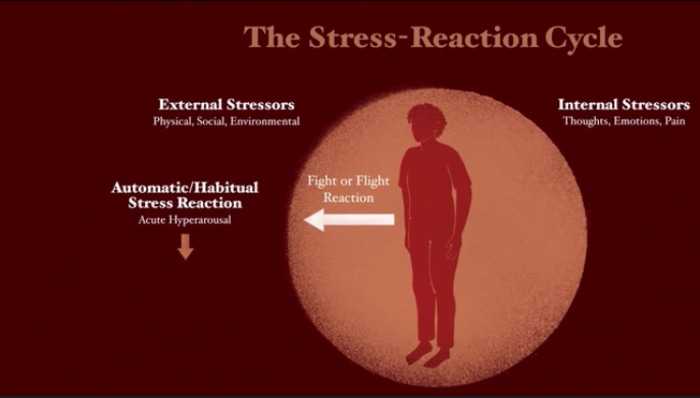
In this section, Kabat-Zinn tackles the issues of stress, pain and suffering.
Beginning with stress, he’s keen for us to understand that stress is inevitable and can’t be ‘cured’.
He walks you through the stress reaction cycle to illustrate how every system in the body is impacted by stress and why our automatic reactions to stress are so damaging.
This was a great way to drive home how high the stakes can be. And Kabat-Zinn’s a microbiologist so this is a clear, scientific perspective.
Thankfully, he also shares how stress can be minimized. And how a mindful response empowers you to counter stressors more positively and wisely.
He also provides simple practical tips to enable you to:
- ‘Drop in’ on mindfulness when the proverbial stuff is hitting the fan
- Avoid getting trapped by your thoughts and narratives
- Free yourself from craving
Kabat-Zinn then uses visualization to guide you through a meditation to face stress with the stability of a mountain.
Mindfulness, pain and suffering & Guided meditation: the body scan
“I’ve worked with thousands of medical patients in the course of my life. And they always say basically the same thing: my meditation practice gave me back my life.”
Here Kabat-Zinn shares how he came to be involved with mindfulness and meditation. In particular how he came to explore how it can change the way pain is experienced.
Thus bringing the idea of mediation to scientifically grounded Western medicine.
He describes how inviting people to participate in their own medical care opens new possibilities to manage and reduce pain and prevent compound suffering.
And he also explains how it works and leads you through a wonderful, therapeutic, body scanning, mediation.
The Science of Mindfulness
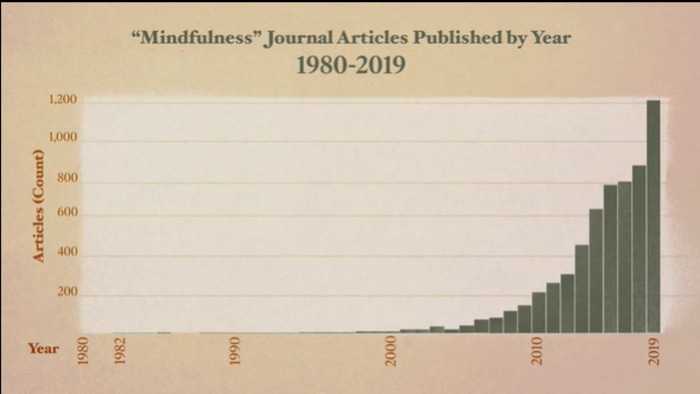
This lesson follows on nicely from the previous one.
In it, Kabat-Zinn explains in more detail how his training as a scientist enabled him to bring rigour to measuring and documenting the benefits of mindfulness. This encouraged an exponential growth in research into mindfulness.
He moves on to discuss studies that demonstrate how mindfulness can help to:
- Reduce cell deterioration
- Calm brain activity
- Reduce inflammation – now regarded to be the root cause of many chronic illnesses
- And positively change your biology
It’s a whistle stop tour of some of the scientific literature on the subject. But if you’re keen to explore some more, the workbook contains more detail and provides references to the studies discussed.
Section 5/6: Mindfulness, yoga and art
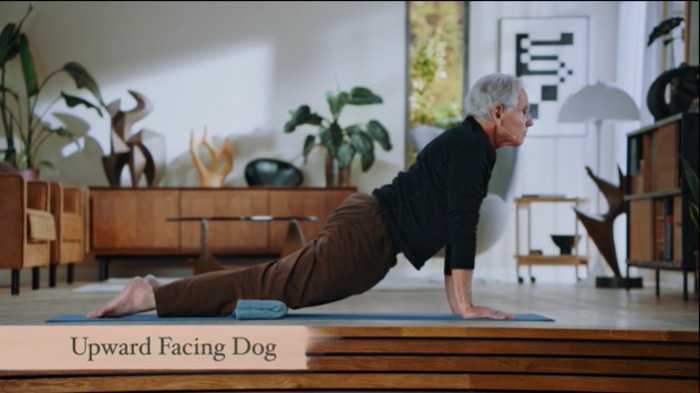
“Maybe we’re already complete… and the thought that we’re not is the problem.”
In this section, Kabat-Zinn shares some of the other ways in which he brings mindfulness to his daily life.
He walks you through a simple Hatha Yoga routine that he performs at the beginning of the day.
Well, he calls it a routine, but he’s keen to stress that you should be alert to how your body feels each day and alter your practice accordingly.
And then he moves on to discuss how poetry, as an art form, can enhance your relationship with mindfulness and shares some of his favorite pieces.
The section ends with a final guided meditation, this time focussed on compassion and kindness.
Section 6/6: Final thoughts

“As far as mindfulness is concerned, I’m not kidding around. There’s so much stress, so much pain, so much illness. And that’s without pandemics and global warming.”
In these two closing lessons, Kabat-Zinn drives home that ‘waking up’ using mindfulness is no longer a luxury.
At this juncture of humanity, It’s a necessity.
He appeals to us to step out of ourselves and see ourselves as part of a whole and maximize the wellbeing of the whole.
“Because that’s how we’re going to discover who we are, as human beings. While we still have the chance.”
As he bids you farewell, Jon encourages you to see this as the start of your journey, and offers guidance on how to continue to grow your mindfulness practice.
“The present moment is all we have. And if we’re in wise relationship to it, it’s the only way to change the future.”
What I Liked About the Jon Kabat-Zinn MasterClass
Comprehensive course grounded in scientific principles and taught by a credible and respected teacher
This is a detailed and fulsome course covering a range of ‘ways in’ to mindfulness and meditation.
It was super helpful (to me) to get a scientific take on the practice, and to hear things explained so simply, clearly and sincerely.
If, like me, you need to understand how and why things work in order to fully engage with them, you will appreciate Jon’s lucid, direct style.
Well structured, lessons build on and support each other
The lessons flow and dovetail together well.
Different aspects or skills are explained, practiced and then combined in a way that promotes incremental understanding and progress.
In as much as a person can use the most effective teaching methods in a pre-recorded lesson, Jon does it all.
There are probing questions for you to answer for yourself, a differentiated approach to practice and a clever breaking down of techniques which are deliberately practiced in turn.
Great balance of theory and practice
There are over two hours of guided meditations which are dropped into the MasterClass in just the right places.
Each one exemplifies well what Jon has just discussed and introduces a range of different ways you can bring mindfulness into your everyday life.
Extremely effective (or it was for me)
I’ve toyed with meditation on and off for years.
The usual pattern is lots of enthusiasm, some small gains, and then the narrative that I’m not doing it ‘right’ kicks in.
This MasterClass broke that cycle, thanks to the rational, scientific context it was placed in and Jon’s teaching style.
It has made me accepting of my practice, whatever my head says! That acceptance has led to bigger gains, especially in terms of responding to stress and pain.
A member of the MasterClass community who had taken Kabat-Zinn’s course summed this up well:
“I took Jon’s MasterClass because I gave up on meditation as I couldn’t understand how to do it or what was expected. I now understand that there’s no state, no vacation from my mind, no…I can just do it.”
Massive feel good factor if you give it a go
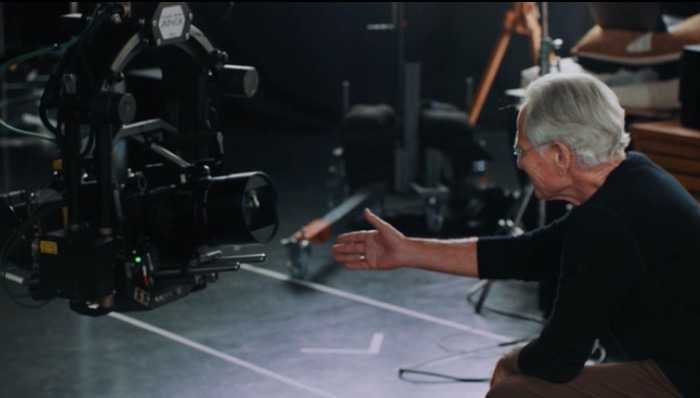
I just plain had a great time engaging with this class.
The moment captured in the picture above will stay with me forever. I really challenge you not to feel better for devoting time to this MasterClass.
What I Thought Could Be Improved/Cons
The class itself needs some time commitment.
Six and a half hours is comparatively long for a MasterClass and to get the most out of it you do need to set aside some time to focus on each lesson.
That said, the lessons themselves are, on average, around 25 minutes long and you can obviously take each one in your own time on different days.
Would benefit from complementary footage to break up the presentation
This class is quite unusual for a MasterClass, in that it deploys very little in the way of complementary footage, stills or music to break up the presentation.
I suspect that is entirely deliberate, given the nature of the class. However, you do need to be aware that this is very much a talking heads class.
Not a problem for me, I found Jon extraordinarily engaging. But depending on your learning style it is worth bearing in mind.
Who is the Jon Kabat-Zinn MasterClass for?
“If you’re breathing, this class could be for you.”
In my opinion this class would be a good fit for anyone who can tick one or more of the following boxes:
- Wants to reduce stress, unhappiness or pain levels
- Seeks a greater level of health and well being
- Doesn’t have the time to mediate, but wants mindfulness to be part of their everyday life
- Is curious to explore mindfulness and mediation for the first time
- Lacks the motivation to get back on the cushion or has struggled with the practice of mindfulness and meditation in the past
- Is intellectually curious and looking for adventure
- Just feels life could be better
So as you can see, unless you are a really hardened cynic who has irrevocably written off mindfulness off as a fad, this course is really for almost everyone.
In terms of existing knowledge? On a scale of 1-10 (where 1 is a newbie and 10 is a guru) I would rate this course as suitable for those who fall between 0-10 – I think it has something to offer even experienced yogi or yogini.
How much does the Jon Kabat-Zinn MasterClass cost?
At the time of writing MasterClass had three subscription offers. The cost of these (per month) is:
- Individual (1 user) $10
- Duo (2 users) $15
- Family (6 users) $20
All are billed annually, which at first glance may seem pricey.
However, you can considerably reduce your costs by taking as many courses as possible.
With nearly 200 courses on the platform you’re likely to find quite a few to interest you. Even if you buy an individual membership and find only 10% of the courses of interest this still works out to only $6 a course:
$120 (annual individual membership fee) / 20 courses = $6.
And if you join with friends or family then the cost of each course is drastically reduced. Check out our MasterClass review or MasterClass cost articles to see how.
Bearing in mind that these classes are taught by global leaders in their fields the value is unbeatable. You can pay over $100 for an online course taught by someone you’ve never even heard of, never mind the caliber of teachers on MasterClass.
What’s more, MasterClass also offers a 30 day refund if you’re unhappy with your purchase.
You can also purchase MasterClass as a gift.
Alternatives to the Jon Kabat-Zinn MasterClass?
On the MasterClass platform itself, there are currently no other classes on mindfulness and mediation.
That said, this class would sit well alongside a number of others I’ve reviewed. These include Donna Farhi on yoga foundations, Matthew Walker and the science of sleep, Robin Roberts on authentic communication or Chris Voss on negotiation.
There are lots of apps you can try such as Headspace, Calm or Insight. I’ve tried a couple of the big names.
For me, apps are a great supplement to mindfulness practice as they enable you to engage anywhere at any time. But compared to this class, they lack substance and using them alone always leads to my practice tailing off after the initial enthusiasm.
Brilliant for the sleepcasts though and these I do still use most nights.
In terms of other platforms, there are a lot of online mindfulness and mediation courses out there.
Coursera has 45 courses on the topic of mindfulness for you to explore. These are led by academics and usually have the benefit of being certified. Coursera’s price structure is a little confusing but courses are generally around $100.
Udemy has over 4,000 courses available, though the instructors are not of the same calibre and experience as Kabat-Zinn. Also, they tend to focus on a narrow range of topics and practices. So you might have to take several of these to gain the depth and range of information covered in his class.
Taking this into consideration, and given Jon Kabat-Zin’s credentials, I would say his MasterClass represents the best value if you fit into the target audience.
The Jon Kabat-Zinn MasterClass: What Others Have Said
No review would be complete without taking a look at what others have said about this MasterClass.
At the time of writing, the course had only been out for a couple of weeks and there were no reviews on the usual forums such as Reddit.
However, members of the MasterClass community who have taken the class had a number of interesting and positive things to say.
Jon’s ability to teach and his general approach to mindfulness come in for a lot of praise:
“I just enrolled and went through the first two lessons, and am already in love with it. Looking forward to more insights. It’s heartwarming to see the way Jon is approaching the concepts.”
“Absolutely LOVE this course. The words, wisdom, explanations are pure gold! JKZ is the most incredible teacher.”
And it’s also clear from the MasterClass community that the class is valued by those with considerable experience of mindfulness and meditation:
“I have been practicing meditation for a few years, almost monastic style. I recently ‘came back to the world’ and now teach it. Jon keeps the teaching to its essence. And he doesn’t leave you there but invites you to infuse your life with the goodness you learn on the cushion. I’m grateful to the work Jon has been doing, researching the topic proving this stuff works. I think you guys have done a great job with the course. Thank you for spreading goodness.”
As with much in life, expectations are everything and I can’t promise this class will live up to yours. However, currently I have found no negative reviews of this MasterClass and this final comment is a good summary of my own experience of the class.
“I took Jon’s MasterClass because I gave up on meditation as I couldn’t understand how to do it or what was expected. I now understand that there’s no state, no vacation from my mind, no…I can just do it.”
Find out how Jon's class compares in our round up of the 10 best meditation courses.
Is the Content Unique?
To be fair, no.
Kabat-Zinn has written over 14 books on the topic and produced a number of DVDs on yoga and meditation. There is inevitably overlap between them and this MasterClass.
That being said, MasterClass has packaged this course so that it gives a complete, up to date, distillation of everything those books and DVDs contain.
It’s intense, visual and engaging in a way that a book can’t be. And it’s more comprehensive and current than any of his DVDs.
Perhaps the most telling comments on the MasterClass Community comes from those who’ve engaged with his other materials and the MasterClass.
“I’m a long time fan of JKZ and I’ve consumed most if not all of his written work and audiobooks. I can’t praise his work enough and I am so very happy that he has been included in the platform. I’ve read a lot of guff and nonsense content on mindfulness, but JKZ is excellent, and absolutely the right person for a Masterclass on mindfulness!”
“I joined MasterClass due to my deep and abiding awe and respect for Jon Kabat–Zinn and the benefits of meditation. I am here to advance my practice and love this format in addition to the many books by Jon and others in my home library.”
And perhaps this comment, of all of them, best sums up the value of the MasterClass over Kabat-Zinn’s other offerings:
“I have been Meditating on and off for a long time. I first bought your book ‘Wherever you go, there you are’ and it helped me find my way. I always wanted to go to see you for an in-person teaching but couldn’t afford the classes or the trip so I feel very lucky to see you here. You are saying the things I thought you would say only now I hear it straight from you and it feels good.”
Verdict: Is the Jon Kabat-Zinn MasterClass Worth It?
It’s a resounding “yes” from me.
I learned so much from this MasterClass. It has tilted my relationship with mindfulness and mediation and resolved the doubts I’ve previously had that have stopped me from continuing with it.
I am now accepting of myself, and my practice and noticing tangible benefits.
If Kabat-Zinn is right about mindfulness, and his credentials suggest he is, then following his advice could impact every aspect of your life and make each moment more meaningful.
My only caveat is that if you’re not prepared to put in the initial time and effort into what he has to say in this MasterClass, you may not reap all the benefits.
And if you feel you learn better by reading, you could try reading any or all of his fourteen books.
But if you’re keen to get started more quickly than a book may allow, then this class is a comprehensive distillation of what Kabat-Zinn has learned in 50 years of practice, packaged in an engaging and motivating way that you can act on immediately.
And of course there are 150+ other MasterClasses for you to try on the platform. Others that might sit well with this MasterClass are Donna Farhi on yoga foundations andMatthew Walker on the science of sleep.
And MasterClass also has a refund policy, which removes the risk of you losing out if you don’t enjoy it.
So what have you got to lose?
John Kabat-Zinn MasterClass FAQs
An individual MasterClass all access annual pass is $120. This will give you access to all 190+ classes (and their resources) for 12 months.
Unfortunately you can’t get the Jon Kabat-Zinn MasterClass for free. But MasterClass has a range of purchasing options and offers refunds if you’re not happy.
Yes, MasterClass offers a 30 day full refund policy.
It consists of 20 video lessons totalling six hours and thirty one minutes.

Liz Hurley has 30+ years of high school teaching experience and is one of our senior writers here at Learnopoly.
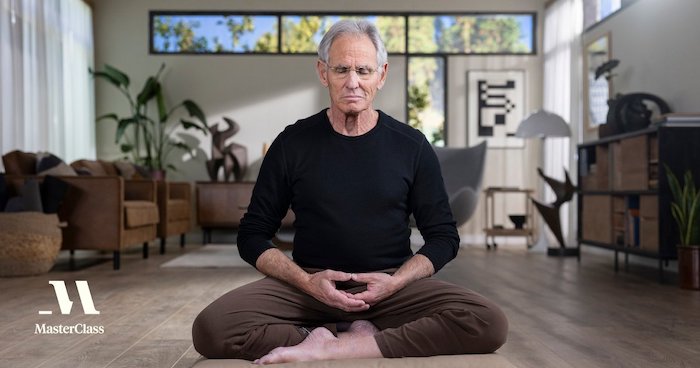


Hi Liz, Is this course on personal mindfulness or can you teach others having taken this course? Or maybe that is the MBSR program, that takes 8 weeks? If you could help me figure this out please. I have all of JKZ books and love them. I am longtime massage therapist and want to start including meditation and mindfulness to my clients.
You can definitely see your skills within the work you write. The arena hopes for more passionate writers like you who are not afraid to say how they believe. At all times go after your heart. “The most profound joy has more of gravity than of gaiety in it.” by Michel de Montaigne.
Thank you so much for your thoughtful words! 😊 I truly appreciate your support and encouragement. Writing with passion and authenticity is always my goal. Love the quote by Michel de Montaigne—so profound!
I like this site very much so much excellent information.
whoah this blog is fantastic i love reading your posts. Keep up the great work! You know, lots of people are hunting around for this info, you could help them greatly.
Thank you so much! I’m really glad you enjoy the posts. That means a lot! I’ll definitely keep sharing valuable content—hopefully, it helps even more people. Appreciate your support! 😊
We are a group of volunteers and opening a new scheme in our community. Your website provided us with valuable info to work on. You’ve done an impressive job and our whole community will be grateful to you.
Thank you so much Margarito! We are happy to hear that the website has provided valuable information for your community project. Wishing you and your group all the best with your new initiative – it’s wonderful to see people coming together to make a difference. I’m grateful for your kind words and support! 😊